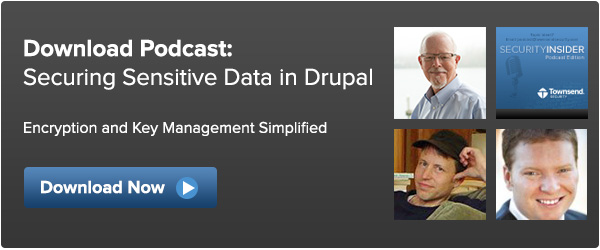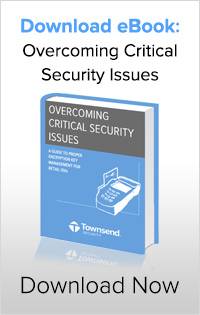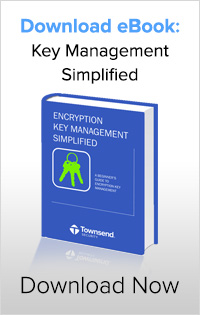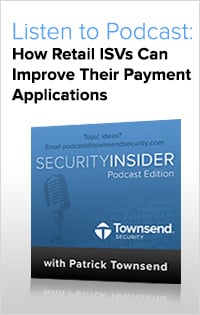Securing Sensitive Data in Drupal made possible through partnerships!
The Drupal content management system may have started-out in a dorm room, but it has become a very successful open source platform that is being adopted at the Enterprise level. Drupal is running everything from small business websites, universities, robust e-commerce environments, Fortune 100 sites, to projects like WhiteHouse.gov! As Drupal developers build out these large-scale installations, the need to keep them secure becomes more apparent due to the volume of information being collected. Sensitive data such as credit card numbers and protected health information (PHI) fall under industry data security regulations such as PCI-DSS and HIPAA/HITECH and must be encrypted. Requirements for protecting information go beyond just credit card numbers & expiration dates, but includes names, email addresses, ZIP codes, usernames, passwords… any stored data that can personally identify an individual.
 Drupal developers and users who need to protect sensitive data know that storing encryption keys within the content management system puts data at risk for a breach, yet storing encryption keys locally in either a file protected on the server, in the database, or in the Drupal settings file has been the norm. None of these methods meet data security best practices or compliance regulations such as PCI DSS, HIPAA/HITECH, or state privacy laws.
Drupal developers and users who need to protect sensitive data know that storing encryption keys within the content management system puts data at risk for a breach, yet storing encryption keys locally in either a file protected on the server, in the database, or in the Drupal settings file has been the norm. None of these methods meet data security best practices or compliance regulations such as PCI DSS, HIPAA/HITECH, or state privacy laws.
While additional compliance regulations may apply depending on industry, this is a basic list of good practical guidance around web-based and virtual environments:
- PCI Security Standards Council (PCI SSC) has issued Cloud Computing Guidelines as well as guidance around virtualization of data protection solutions, so you can be PCI compliant with a cloud-based key management and encryption solution.
- The Cloud Security Alliance (CSA) has also issued good guidance around security in cloud environments in version 3 of their documentation (domain 11 applies to encryption and key management).
- National Institute for Standards and Technology (NIST) also has produced a guidance for security in cloud environments(NIST Special Publication 800-144) which provides excellent guidance for people looking to move into cloud platforms and protect data there.
The Drupal community collaborates to develop modules for the platform, sharing knowledge, experience, and creativity. The developers try to avoid duplicate functionality, so the existing Drupal Encrypt module was used as the first step to protecting sensitive data, however the plug-ins for the Encrypt module did not provide secure key retrieval options as the encryption keys were all still found within that same server. Security best practices tell us that personally identifiable information needs to be protected with industry standard AES encryption and that protecting the encryption key away from the data is critical. It became apparent that a key management system that was outside of the Drupal installation was required.
Working together to solve the Drupal data security problem, the security experts at Townsend Security and Drupal developers at Cellar Door Media have released the Key Connection for Drupal solution, which addresses the need for strong encryption and encryption key management within the Drupal framework. Now personally identifiable information collected during e-commerce checkouts and user account that contain names and e-mail addresses can be easily encrypted, and the encryption keys properly managed, by organizations that collect and store that sensitive information.
Drupal developers and Drupal users share a concern about multiple compliance requirements and the liability that goes along with being audited for correctly protecting personally identifiable information. When designing an environment, there is a need to know what methods of encryption you are using, that the encryption key management is implemented correctly, and how secure will the data collection and storage processes be. The Key Connection for Drupal module allows designers to either retrieve a key and encrypt locally, or send the data to Alliance Key Manager (AKM) to perform on board encryption. They have the choice to use the Alliance Key Manager strictly as a key manager, or they can use it as an encryption service as well.
A few benefits of this new Key Connection for Drupal module are:
- Access to remote key retrieval
- NIST compliant on-board encryption
- Encrypting data locally in your database
- Using a built-in function to allow for PCI compliant encryption to be done off the web server
To learn more, I encourage you to listen to this special podcast to hear Chris Teitzel; CEO of Cellar Door Media, Rick Hawkins; owner of Alchemy Web Solutions, and Patrick Townsend; CEO of Townsend Security, talk about encrypting sensitive data in Drupal. They will also discuss how a Drupal site builder or developer gets access to Key Connection for Drupal, the Alliance Key Manager, and what options are available.







 Excellent Back End Support - When it comes to back end support, the people you deal with on a day-to-day basis can make or break a partnership. Townsend Security works closely with our partners to ensure their success. We provide our partners with training, marketing materials, OEM options, as well as easy and cost effective licensing models to get our powerful solutions protecting your customers as soon as possible.
Excellent Back End Support - When it comes to back end support, the people you deal with on a day-to-day basis can make or break a partnership. Townsend Security works closely with our partners to ensure their success. We provide our partners with training, marketing materials, OEM options, as well as easy and cost effective licensing models to get our powerful solutions protecting your customers as soon as possible.


